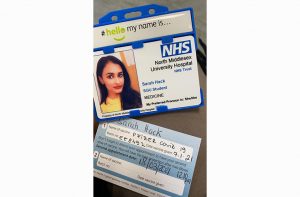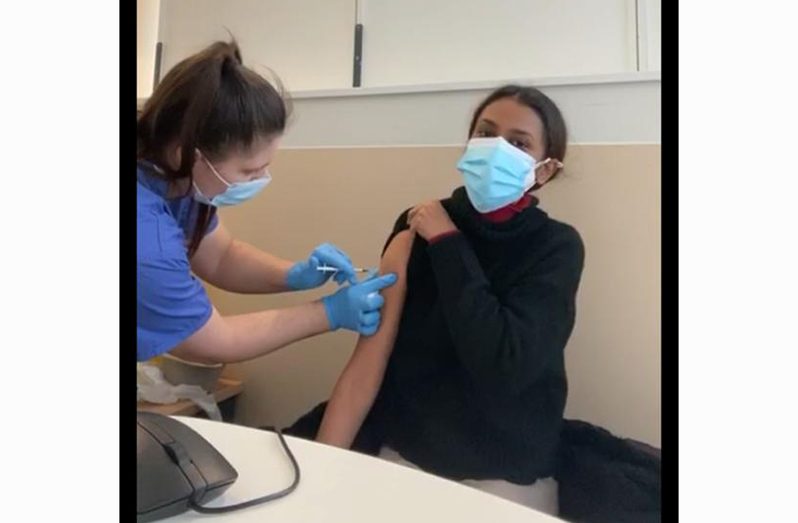–says ‘worst-case scenarios’ are all treatable
By Rehana Ahamad
SARAH Hack, a young Guyanese studying medicine in England, is encouraging all Guyanese to remain open to becoming vaccinated against the novel coronavirus (COVID-19), once the vaccines become available here in Guyana.
The 22-year-old said that she has received almost every vaccine available in Guyana and most parts of the world. On Thursday, she received her first shot of the prominent COVID-19 vaccine, Pfizer, and is expected to receive her second dose in March.
Just before Christmas, Hack journeyed to England, where she commenced the final part of her studies at the North Middlesex Hospital in London. As a medical student, Hack is a frontline worker; as such, she falls into the priority category of persons to get the COVID-19 vaccine. Of course, the vaccines are not compulsory. Asked about any apprehension she may have had towards becoming vaccinated, Hack asserted, “I was not apprehensive in the least.”

She argued, “COVID-19 has taken almost two million lives so far, and as far as adverse reactions go, there are about 1.5 million persons who have been vaccinated so far, and there are only a handful of persons, maybe like 20, who have had adverse reactions.”
Hack emphasised on the fact that none of the side effects are fatal. “The COVID-19 vaccine has not killed anybody to date, while COVID itself has taken almost two million lives worldwide,” she posited, adding: “I think it is the only hope we have right now, and the only way we can see this ending.”
THE POLIO DEVASTATION
The budding physician also drew critical reference to the polio devastation of the 1900s.
“Polio ravaged the world, and devastated almost every country’s population in the 40s and 50s. And then there were these guys, Dr. Salk and Dr. Sabin, who came up with a vaccine that they gave for free. Now, polio is eradicated in the entire world, except for two countries, because of their individual issues,” Hack noted.
The first polio vaccine was developed by Dr. Jonas Salk and was first used in 1955, whilst the second was developed by Dr. Albert Sabin, and first used in 1961.
Hack highlighted that the majority of persons suffering from side effects of the COVID-19 vaccines are those who are hypersensitive.
“The worst-case scenario is what they’ve been seeing; something called anaphylaxis, which is basically your body going into shock. Your heart rate increases, your blood pressure drops, and you feel a bit light headed and you tend to faint,” Hack specified. She noted, however, that most of the side effects are common with almost every vaccine.
“The handful of persons who have experienced these side effects are typically those persons who have food allergies; people who are hypersensitive, or persons with asthma or so,” the emerging doctor clarified.
VACCINATION DAY!
Hack said that the process to administer the vaccines is “pretty much the same” in most countries. She explained that in England and the United States, persons are notified of their eligibility to receive the vaccine, either via email or phone. In a country such as Guyana, with vast lands and many remote areas, there could be instances where house-to-house notification may be necessary. “The system in place is very much foolproof, I would say. I’ve spoken to my US colleagues, and they basically went through the same thing,” Hack emphasised.
She said that in England, priority was given to persons above the age of 80, along with all frontline workers. Relating her experiences, the young student said that when she got to the vaccination centre, protocol dictates that she be given a pamphlet explaining all the side effects of taking the vaccine. This was done, and Hack was administered her first dose of the Pfizer vaccine. “The common side effects are things such as headache, fever; some persons had night sweats and chills, and some experienced nausea,” Hack noted.
INJECTION TENDERNESS
Six to seven hours after receiving her shots, Hack started to experience slight tenderness at the injection site; however, the minor discomfort escalated to pains after a few hours. It was her only symptom. “I took it at 12:30pm, and up to like 06:30pm, my pain was like one or two out of 10. From like 7pm to now (10:15pm), it has been like six out of 10…I might take a paracetamol,” Hack related. She maintained that soreness of the site of the injection is the most common side effects of almost any injection.
Hack told the Guyana Chronicle that she was not at all hesitant or concerned about the side effects, mainly because the COVID-19 response in England has been humane, and quite considerate to patients. “…plus, most of my friends are in the medical field,” Hack added.
The young woman is currently studying on a full scholarship received from the Government of Guyana. She spent three years at a medical school in Grenada, after which she proceeded to England to begin the second portion of the same course. Hack will wrap up her studies and return home after a year-and-a-half.



.jpg)











